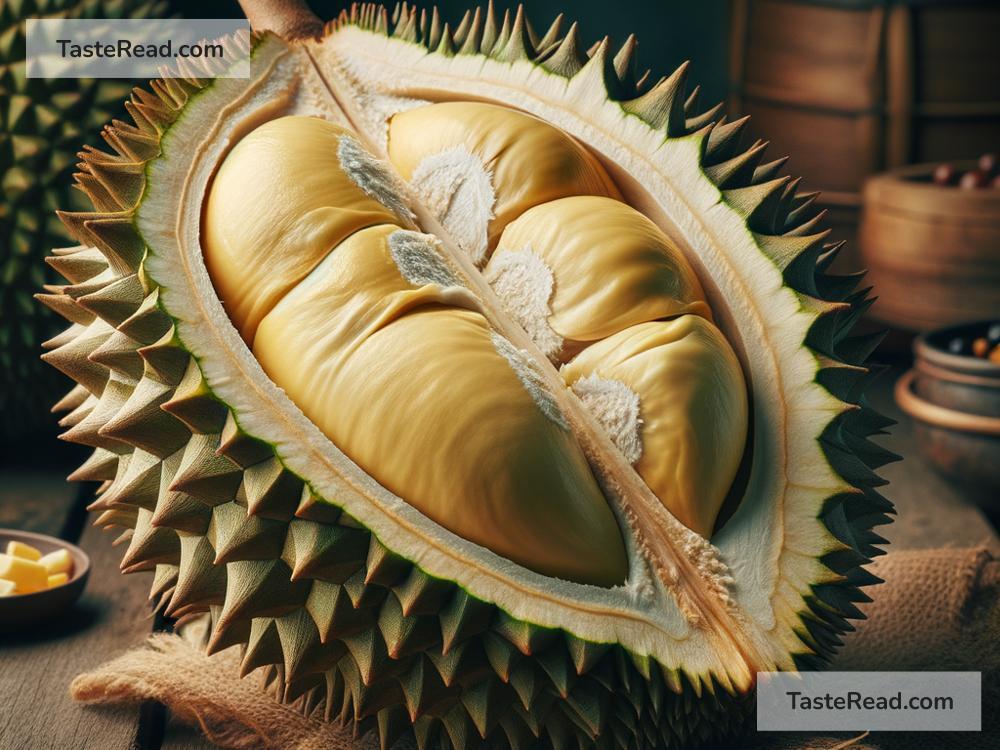The Mystery Behind Durian’s Divisive Taste
Durian, often called the “king of fruits,” is one of the most fascinating and controversial fruits in the world. Some people adore it, calling it a delicacy and even traveling miles to enjoy its unique flavor. Others can’t stand it, saying it smells terrible and tastes rotten. What is it about durian that creates such strong reactions? Why do some people love it while others hate it? Let’s explore the mystery behind this divisive fruit.
What Is Durian?
Durian grows in tropical countries like Malaysia, Thailand, Indonesia, and the Philippines. It is a large, spiky fruit with a creamy yellow or white flesh inside. People often describe durian’s smell as incredibly strong, with some comparing it to rotten onions, sweaty socks, gasoline, or even sewage. Some cities go so far as to ban durian in public spaces due to its overpowering scent.
Yet, for those who enjoy durian, the smell is part of its charm. They describe the aroma as sweet and intoxicating—a hint of what’s inside. When you eat the fruit, you’ll likely notice a rich, sweet, and slightly savory taste. Durian’s flavor has been described as “custard-like,” with hints of caramel, almonds, and even garlic. It’s this mix of tastes and scents that makes durian so unique, but also so polarizing.
The Science Behind Durian’s Smell
The strong smell of durian comes from a mix of sulfur-based compounds. Scientists have identified more than 50 different chemicals in durian that contribute to its scent. These include sulfur, which is known for its pungent smell, and other compounds that give off fruity, sweet, or musky aromas.
What makes durian different from other fruits is the high concentration of these odor-causing compounds. While fruits like mango and pineapple also contain strong-smelling chemicals, they are balanced by sweeter, lighter scents. In durian, the sulfur compounds dominate, creating an intense smell that divides opinions.
Interestingly, research has shown that people’s genetic makeup might play a role in how they perceive smells. Some individuals are more sensitive to sulfur compounds and might find durian’s scent unbearable. Others might not detect the unpleasant smells as strongly and focus on its sweeter notes instead.
Why Does Durian Taste So Polarizing?
Durian’s taste is as complex as its smell. For fans of the fruit, the creamy, custard-like texture is irresistible. The combination of sweet and savory flavors creates a truly unique experience. There’s no other fruit quite like it!
However, for its critics, the flavor can be overwhelming and strange. The hints of garlic and onion clash with the sweetness, leaving them confused and uncomfortable. Texture is also a factor—some people find durian’s soft, squishy flesh unappetizing.
Many experts believe personal experiences and cultural upbringing have a lot to do with how people feel about durian. In Southeast Asian countries, durian is a beloved fruit that is celebrated in festivals and incorporated into traditional dishes. People who grow up eating durian develop a taste for it and associate it with happy memories.
On the other hand, those who are unfamiliar with durian may struggle to enjoy something so unusual. If you’ve never tried a fruit with such a strong smell or complex taste, durian can be shocking at first bite. Some people say it’s an acquired taste—one you need to try several times before appreciating it. But others simply cannot get past the smell or flavor.
How To Enjoy Durian (If You Dare!)
If you’re curious about durian but unsure how you’ll react, there are ways to ease into it. Many people recommend trying it in desserts like cakes, ice creams, or smoothies. These recipes tone down the strong flavors and introduce you to durian in a more approachable way.
If you’re ready for the “real thing,” look for high-quality durian at a market or store. Different varieties of durian have different levels of sweetness and pungency, so it’s a good idea to ask which type is milder for beginners. Make sure you eat durian in a well-ventilated area to avoid being overwhelmed by the smell.
Lastly, keep an open mind! Durian is not just a fruit—it’s an experience and a symbol of tropical culture. Even if you don’t enjoy the taste, you’ve had the chance to try something that millions of people love.
Conclusion
Durian’s divisive taste is a true mystery of nature. Its strong smell and complex flavor evoke powerful reactions—from love to disgust. Science, genetics, cultural familiarity, and personal preference all play a role in shaping how we feel about this spiky fruit. Whether you’re a fan or a critic, durian deserves respect as a cultural treasure and a fascinating example of how different people perceive the world around them.
So, will you give durian a chance? Who knows—you might find yourself joining the ranks of its devoted fans. Or, you might confirm your suspicion that this fruit isn’t for you. Either way, trying durian is a story worth telling!


